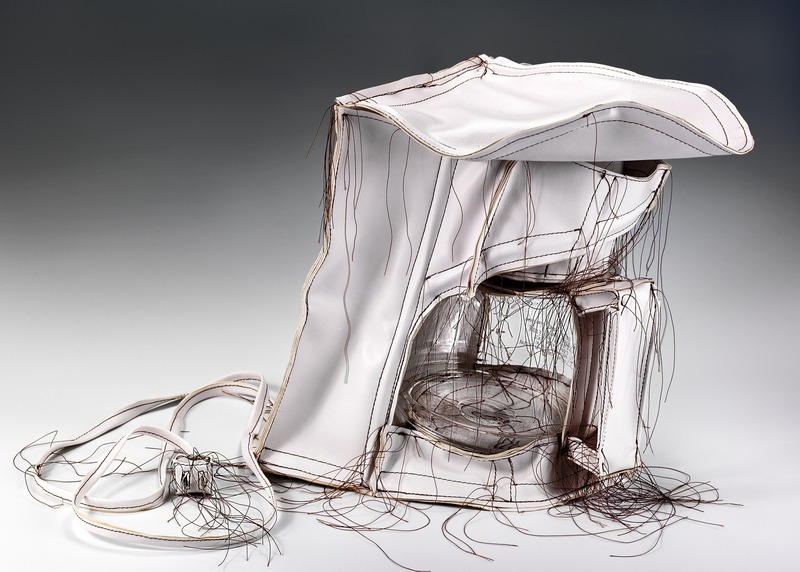Title
White Coffee Maker
Creator
Description
Margarita Cabrera, White Coffee Maker, 2011, vinyl, copper wire and thread, Smithsonian American Art Museum, Museum purchase through the Luisita L. and Franz H. Denghausen Endowment, 2012.35.2A-D, © 2011, Margarita Cabrera
Subject
Date
Type
Sculpture
Contributor
Annotation
This is a work of soft sculpture. As the title suggests, it is a white coffee maker. However, instead of the typical hard plastic, the body is made of pliable white vinyl stitched together with red and black thread. The ends of the threads hang loosely and errantly from the surface of the vinyl, as they would on an unfinished garment. Although there is some structure to the sculpture, being held up in some areas by internal copper wire, the whole sculpture is relatively deformed, with the vinyl buckling in areas. The only component of this piece that comes from an actual coffee maker is the glass coffee pot, however, even its rigid handle is replaced by a soft vinyl one.
The artist’s use of loose threads in her collection of soft sculptures draws attention to the objects and those who created them. The inclusion of haphazard threads is indicative of the often-forgotten role of laborers in the manufacturing process, many of whom are Latina migrants in maquiladoras located along the border. It is this population that the artist most often seeks to address and/or work with in her social practice and art. Additionally, while the soft sculptural recreations of mass-produced commodities are not limited to appliances or items of domesticity and commercial service, it is possible to draw a connection between Margarita Cabrera’s works depicting toasters, vacuum cleaners, coffee pots, and the like, to the hands of Latinas who built or utilize these objects in the service industry. The United States Bureau of Labor Statistics documents that Latinas are overrepresented in the service industry including “leisure and hospitality.” When one consumes a meal at a restaurant or walks into a clean hotel room, each prepared using mass-produced goods, in many cases, they are unknowingly interacting with the lives and craftsmanship of numerous Latina and other migrants. (Author: Natalie Lawler)
The artist’s use of loose threads in her collection of soft sculptures draws attention to the objects and those who created them. The inclusion of haphazard threads is indicative of the often-forgotten role of laborers in the manufacturing process, many of whom are Latina migrants in maquiladoras located along the border. It is this population that the artist most often seeks to address and/or work with in her social practice and art. Additionally, while the soft sculptural recreations of mass-produced commodities are not limited to appliances or items of domesticity and commercial service, it is possible to draw a connection between Margarita Cabrera’s works depicting toasters, vacuum cleaners, coffee pots, and the like, to the hands of Latinas who built or utilize these objects in the service industry. The United States Bureau of Labor Statistics documents that Latinas are overrepresented in the service industry including “leisure and hospitality.” When one consumes a meal at a restaurant or walks into a clean hotel room, each prepared using mass-produced goods, in many cases, they are unknowingly interacting with the lives and craftsmanship of numerous Latina and other migrants. (Author: Natalie Lawler)
Access Rights
Image is displayed for education and personal research only. For individual rights information about an item, please check the “Description” field, or follow the link to the digital object on the content provider’s website for more information. Reuse of copyright protected images requires signed permission from the copyright holder. If you are the copyright holder of this item and its use online constitutes an infringement of your copyright, please contact us by email at rhizomes@umn.edu to discuss its removal from the portal.
